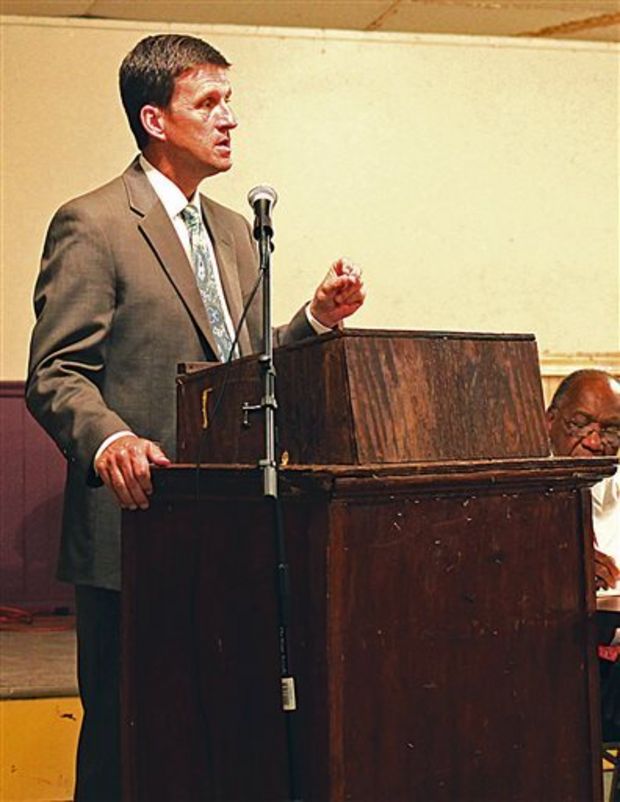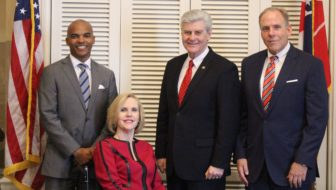

JACKSON, Mississippi (AP) — Mississippi’s public universities are likely to have less money to spend on capital projects in the state’s 2016 budget year, under projections the universities agreed to with lawmakers in 2013.
The College Board Thursday approved $710 million in bonding requests, as agencies make requests of the Legislature in advance of next year’s sessions. Each university, as well as the University of Mississippi Medical Center, Mississippi State University’s agriculture units and the system office, nominate their top 10 capital projects for consideration.
Those lists have become less influential because of an agreement that the College Board made with lawmakers in 2013 to reduce uncertainty over bond amounts. Lawmakers approved no new borrowing in 2012, making it hard for universities to plan projects that might take multiple years of funding.
In 2013, lawmakers agreed to a roadmap of how much they would borrow over the next three years, allowing universities to start some large projects with assurance that funding would continue to flow. The Legislature approved $96.5 million in bonds in the 2014 budget and $93.8 million in the 2015 budget.
That amount is projected to fall to $68.2 million in 2016. The drop stems in part from the absence of medical school funding in the 2016 budget. Lawmakers have borrowed $61.5 million over the last two years for a new medical school building at the University of Mississippi Medical Center, but the medical center is projected to receive no new bonding in 2016.
Universities have also received direct legislative appropriations for maintenance and renovation, getting $13.2 million in 2014 and $17 million this budget year.
Harry Sims, the board’s assistant commissioner for real estate and facilities, said that the College Board wants lawmakers to stick to the agreement.
“We’re happy with that,” Sims said.
But that means in most cases, universities will only be able to fund one or two items on their top-10 lists.
“We’re going to be fortunate to get No. 1,” Sims said. “All those other requests become moot.”
Mississippi’s universities have turned to internal funding for construction and renovation projects. For example, Ole Miss rates renovation of a former Wal-Mart that it calls the Jackson Avenue Center as its 10th-most important project for state bond money. But half the building has already been renovated and College Board members Thursday approved Ole Miss going forward with the second half at an estimated $5.5 million cost.
But the College Board itself, which can’t raise money from students, faces pressing needs at its headquarters in Jackson. Sims said that the Department of Finance and Administration has agreed to pay an estimated $3 million-plus to stabilize structural problems in the basement and ground-floor level of the Educational Research Center being caused by expanding Yazoo clay. The same expanding ground is displacing hot- and cold-water lines for heating and cooling, which would cost $650,000 to fix. The electrical switchgear at the complex is outmoded and needs to be replaced at an estimated $1.7 million cost.
“I know everybody has priorities, but this is a big deal,” said trustee Alan Perry. “We have got to get this elevated.”
College bonding projects
JACKSON, Miss. — Mississippi’s College Board approved the top 10 construction priorities of the state’s universities Thursday. The total amount projected to be provided by the Legislature for each institution, as well as the top two projects for each:
___
Alcorn State University
Proposed bond allocation: $7.1 million.
Top projects: 1. Technology classroom building, $8 million; 2. Disability modifications, $10.9 million
___
Delta State University
Proposed bond allocation: None.
Top projects: 1. Zeigel Hall renovations, $6.6 million; 2. Walter Sillers Coliseum renovation, $5.4 million.
___
Jackson State University
Proposed bond allocation: $8.5 million.
Top projects: 1. College of Education & Human Development, $12.5 million; 2. Rose E. McCoy Auditorium renovation, $2 million.
___
Mississippi State University
Proposed bond allocation: $13 million.
Top projects: 1. Engineering and science complex, $14 million; 2. Music department building, $11.4 million.
___
Mississippi State Division of Agriculture, Forestry and Veterinary Medicine
Proposed bond allocation: $12.1 million.
Top projects: 1. Food science, nutrition and health promotion complex, $12.1 million; 2. Blackjack forest and wildlife research facility, $3.3 million.
___
Mississippi University for Women
Total for top 10 projects: $6.5 million.
Top projects: 1. Fant Memorial Library addition and renovation, $2.5 million; 2. Keirn and Taylor halls demolition, $2.3 million
___
Mississippi Valley State University
Proposed bond allocation: $6 million.
Top projects: 1. Fire sprinklers, $2 million; 2. Academic skills redesign, $6 million.
___
University of Mississippi
Proposed bond allocation: $10 million.
Top projects: 1. Johnson Commons East, $7.6 million; Somerville Hall, $5.5 million.
___
University of Mississippi Medical Center
Proposed bond allocation: None.
Top projects: 1. Central core support office, $9.6 million; 2. School of Health Related Professions expansion, $14.6 million.
___
University of Southern Mississippi
Proposed bond allocation: $5 million.
Top projects: 1. General repair and renovation, all campuses, $6 million; 2. Bolton Hall renovation, $3 million.
___
Educational Research Center (College Board headquarters in Jackson)
Proposed bond allocation: None.
Top projects: 1. Campus electrical service replacement, $1.7 million; 2. Replace hot/chilled mechanical water lines, $650,000.
Source: College Board.



